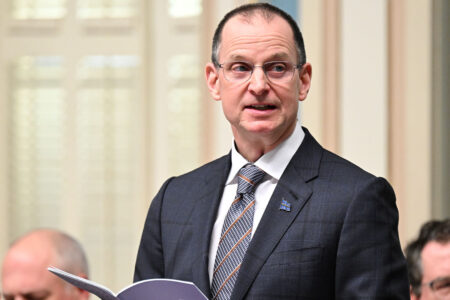
The Official Languages Act is about to undergo a sea change. That is, if the document “English and French: Towards a substantive equality of official languages” in Canada tabled in the Commons earlier this year accurately reflects the government’s intentions. The proposed policy agenda is more than a simple tweaking of the 1969 act. It represents a mini-revolution in its underlying philosophy, which will undoubtedly come as a surprise outside Quebec, where language issues rarely make the headlines.
In a nutshell, the focus is no longer on bilingualism (although that, of course, remains a prime objective), but on saving French, with the implicit postulate that the second is a necessary condition for the first.
One can only admire the courage of Mélanie Joly, the minister of economic development and official languages, for laying out, in terms not often heard in English Canada, the difficult task ahead if Canada is to effectively remain a bilingual nation. The 2021 census will undoubtedly show that the share of Canadians listing French as their mother tongue is now below 20 per cent.
The following extracts nicely capture the document’s flavour: “The Government of Canada recognizes that the need to ensure the security and vitality of the French language requires a particular approach.”
Despite the 1969 act and applicable provincial laws, including those in Quebec, the use of French has deteriorated in Canada. Francophone communities made up close to seven per cent of the population outside Quebec in 1971, but that declined to below four per cent in 2011 and could decrease to three per cent by 2036, according to Statistics Canada projections.
The document goes on to call for “positive measures” in favour of French with the stated objective of maintaining the proportion of francophone communities outside of Quebec at slightly more than four per cent. The minister wants to do more than stem the tide, which is already a herculean task. She hopes to reverse to it.
I share her dream of a Canada where French, outside Quebec especially, no longer needs to fight daily to survive, but is growing. The question is not so much whether that dream is doable, but whether non-francophone Canada is ready to accept the “positive measures” necessary to make it possible. In the end, the question is simple: how important is French to the survival of Canada as a unified state? Given political will, even dead languages can be revived, Hebrew is a modern example.
Quebec: Changing perceptions
For the federal government, supporting French takes on a different meaning in Quebec and outside. In Quebec, promoting French in essence means following the provincial government’s lead, something Ottawa has not historically been perceived as doing, certainly not by nationalist Quebecois. Indeed, as defender of “bilingualism,” viewed by many as a Trojan horse for English, the perception of the federal government in matters of language is not necessarily positive.
The document proposes that federally chartered firms and institutions (currently outside Quebec’s Bill 101), be subject to equivalent francization obligations, but without being formally subject to Quebec’s language law. This marks a break from the past. True change in politics often begins with a change in perceptions. If the minster succeeds in altering Ottawa’s perception in Quebec from that of defender of bilingualism to defender of French, she will have achieved a minor miracle, at the possible cost, however, of losing Anglo-Quebec voters. That’s a delicate balancing act, but perhaps a necessary trade-off if it brings at least some nationalist Quebecois back into the federalist (read Liberal) fold.
Staying in Quebec, it is difficult to overstate the symbolic value of the minister’s stated intention of formally enshrining the obligation that future judges of the Supreme Court be functionally bilingual. How the rest of Canada reacts will be an interesting test.
However, arguably the most revolutionary shift, both in perception and juridical, is in the meaning given “equality.” The prefix “substantive” in the document title is no accident. It is an explicit recognition that Canada’s two languages are not equals or, paraphrasing Aristotle, that treating two unequals (languages, here) as equals is a form of inequality.
For example, Quebec’s English-language minority and Ontario’s French-language minority should not necessarily be viewed as entitled to the same rights. The “inequality” has been implicitly recognized in court rulings. However, a new act would make it explicit. I’m not a lawyer but it will be interesting to see the wording of an interpretation rule codifying “substantive equality,” the new guarantees it accords French and how again it is received outside Quebec.
Outside Quebec: Changing reality
The revolutionary nature of the new meaning of “equality” will, however, be insufficient, I fear, to arrest the decline of French outside Quebec. To state the obvious, not only are the provinces not necessarily willing partners in the promotion of French, but the demographics are truly disheartening. Language survival is about numbers and territory. The document rarely goes beyond what I would call a minority mindset, emphasizing rights: the right to French schools, French public (federal and federally regulated) services; and the right to work in French in federal and federally regulated workplaces. Strengthening such rights is undeniably desirable, as is the expansion of the teaching of French. But, none of this will stop its continued decline almost everywhere outside Quebec.
The document takes a first step towards recognizing the territorial dimension of language survival by introducing the notion “regions with strong francophone presence” (RSFP), a welcome change from coast-to-coast bilingualism, a beautiful ideal, but a utopia.
Ensuring the right of francophones in Vancouver to French schools and strengthening their community institutions are praiseworthy objectives, as is facilitating the learning of French by all Vancouverites. But, Vancouver will never provide an environment, even with the best efforts, where French is a language of everyday life, transmitted from generation to generation. If French is to flourish outside Quebec, it needs places, towns, and spaces where French is the dominant language, and its use is not only a right but an obligation. The unequal relationship between the two languages means that the maintenance of French, unless overwhelmingly favoured by demography (rare outside Quebec), will require some form of coercion. Bill 101 is the prime example, deemed necessary even in majority-French Quebec. A shopkeeper in Sudbury will not automatically (voluntarily) advertise in French, nor will a factory manager naturally allow employees to work in French, unless obliged to do so.
It is at this point that we meet the limits of what Ottawa alone can usefully do. It is by no means self-evident how a federal government with few tools on the ground would go about fostering French-dominant environments. Strengthening French in local federal and federally regulated workplaces, however welcome, will go only so far, rarely accounting for more than a few per cent of the local workforce. Even in Ottawa, some 90 per cent of the workforce declares English as the language most often used at work, according to the 2016 census. The language at work remains the challenge. Here again, one must admire the minster for bringing the issue to the table, but ultimately, she has few tools at her disposal.
Is Francophone immigration the answer?
The document puts great hopes in immigration, one of the few areas Ottawa directly controls. The document makes it clear that the government is “counting on Francophone immigration to reverse this worrisome trend.”
I’m all for francophone immigration. But, I do not share the document’s optimism. The direct demographic impact (first-run effect in economist jargon) of bringing francophones to Moncton or Sudbury will, of course, be to increase the francophone population. But, unless the local environment is conducive to the transmission of French, many of the immigrant’s offspring will, like old-stock francophones, disappear over time into the anglophone maelstrom.
I mention these two cities because immigrants tend to settle in urban areas. Moncton and Sudbury are the only major metropolitan areas outside Quebec where francophones are more than a quarter of the population, respectively 34 and 26 per cent. However, home language shares are considerably lower, respectively 28 and 13 per cent, suggesting that English remains more attractive and socially useful. The 2016 census also tells us that French was the language used most at work by some 17 per cent of the workforce in Moncton and five per cent in Sudbury, hardly environments conducive to the transmission of French.
To find a majority French environment, one needs to go down the urban ladder to places like Hawkesbury, Ontario, or Bathurst and Edmundston, N.B.. Even there, the home language/mother tongue ratio continues to favour English in the first two. Edmundston is the only urban centre with a population of more than 10,000 outside Quebec where the ratio favors French. But, it is located in solidly French Madawaska, basically a demographic continuation of Quebec’s Lower St. Lawrence region. We need to go even further down the ladder to find other environments where French holds its own, communities like Hearst, a linguistic island in Northern Ontario, or Shippagan and Bouctouche in the Acadian heartland. In short, we would be asking immigrants to settle in small places where French dominates or, barring that, to be more successful in resisting anglicization than old-stock francophones. It’s a lot to ask.
Creating French-dominant environments
In the end, we come back to the need to support spaces where French is not only a right but a necessity, and not only for francophones. I can understand why the document rarely goes beyond a rights-based perspective, focusing on recourse mechanisms for workers and compliance by employers. But, however laudable, this is not the same thing as creating French-dominant environments. Even in the federal civil service, where the government has the necessary powers, the document largely stays true to a bilingual perspective, focusing on the right of francophones to use their language (hopefully understood by their anglo colleagues). Can we imagine going one step further, possibly imposing French as the language of work for all in given areas of the federal apparatus?
As for the private sector, a committee of experts has been mandated to develop options for implementing workers’ rights in federally regulated industries outside Quebec. Leaving the actual policy to a future committee is an admirably frank admission that one hasn’t thought through what one is really going to do and that, in the absence of local equivalents of Quebec’s Bill 101, ensuring the use of French in the workplace in RSFPs (whose contours the committee is equally asked to define) does not lend itself to ready-made solutions.
Why, may I suggest, not opt for a bottom-up approach for RSFPs? Any municipality, township or other sub-provincial authority outside Quebec could request to be designated a French heritage jurisdiction (or something equivalent). The initiative would lie with local governing bodies. Thus, the town councils of places like Hearst or Bouctouche could request that their towns be thus designated.
With that designation, benefits and obligations would follow. Firms in designated communities would have access to tax deductions (or other support) for French-language training and translation. Local authorities would have similar access to programs to expand French. Federal institutions and Crown corporations would be required in time to adopt French as their language of work. On the obligation side, local authorities would be asked to draw up programs adapted to their particular needs, which, besides making French the internal work language, might for example include bylaws requiring French on public signs and in business dealings with the municipality. I’m sure the reader can think of other measures.
Whether such an approach would stop the general decline of French outside Quebec I do not know. But, it would at least enable RSFPs to create French-friendly environments. Why not let each community decide how far it wishes to go, in the knowledge that within the limits of its powers and resources it can count on federal support?










